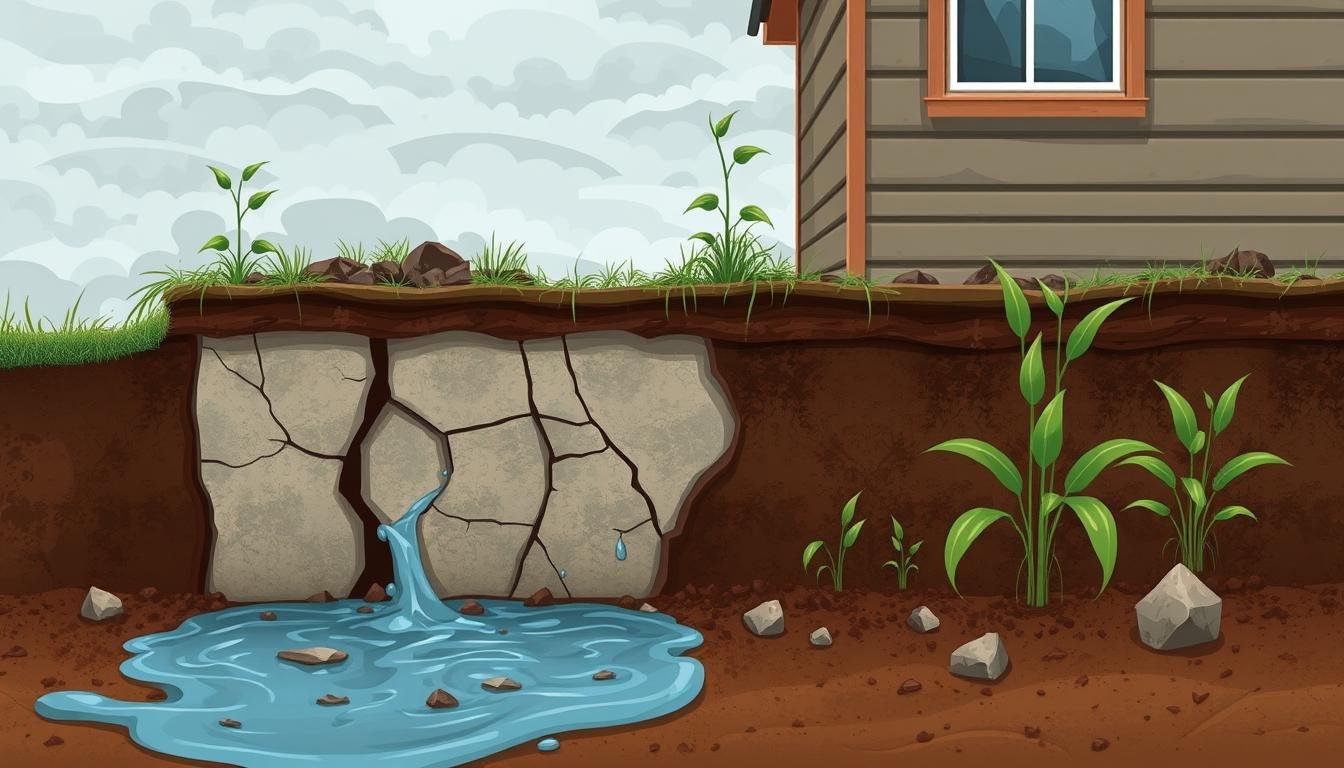Safeguard Your Home’s Foundation from Water Damage: Best Practices
Did you know that 1 inch of rainwater off the roof can mean over 620 gallons of water that needs to be managed1? Water not managed properly around a home’s foundation can cause serious damage. This includes structural harm, mold, and expensive fixes. As a homeowner, it’s key to know the risks and act early to protect your foundation. Keeping water away from your home’s foundation is vital2. Water pooling can weaken the soil and make the foundation sink2. Make sure your gutters are clear and water flows right to avoid foundation damage2. Also, a well-kept garden with good soil and drainage helps keep water away from your foundation2. Key Takeaways Proper drainage and water diversion are crucial to protecting your home’s foundation from water damage. Standing water can significantly compromise the structural integrity of your foundation. Regular gutter and landscaping maintenance can help prevent water accumulation near the foundation. Sump pumps and sealants can provide short-term solutions to address moisture and flooding issues. Professional inspections and maintenance plans are essential for early detection and prevention of costly foundation repairs. Understanding the Risks and Causes of Foundation Water Damage Common Culprits Behind Water Infiltration Water damage can seriously harm a home’s foundation, causing many structural problems. Signs include cracks in walls, damp floors, and windows that won’t close right3. After heavy rains, water near the house might mean foundation issues3. Look for damp spots, mold, and musty smells to catch water damage early3. Cracks in walls, erosion, bowed walls, and basement water are all signs of foundation damage3. Erosion can cause the foundation to settle and damage the structure3. Moisture can weaken beams, posing safety risks3. Long-term basement moisture can harm the foundation, grow mold, and lower property value3. Foundation cracks often come from soil movement, tree roots, poor drainage, and construction mistakes3. Leaks can be from groundwater or plumbing problems3. Underground water can press against the foundation, causing cracks or settlement3. Water damage is behind 24% of property insurance claims in the U.S4.. Plumbing issues are a big cause of water damage, leading to slow water buildup4. Heavy rain, storms, and floods can also overwhelm drainage systems4. In New Zealand, homes face water-related problems due to the climate and land shape5. Moisture in the soil can cause foundation cracks, shifts, and even failure5. Piles, deep supports, can fail when the soil can’t hold its weight due to water5. Finding water damage early is key to avoiding big repairs5. Look for foundation cracks, sticking doors, sagging floors, mold, water pooling, and strange smells5. Poor drainage, soil reactions to water, and plumbing leaks are common causes5. Safeguard Foundation Water Damage: Essential Preventive Measures Keeping your home safe from water damage starts with a good maintenance plan. Regular home maintenance is key to avoiding flood damage and keeping your home safe6. First, check your foundation for cracks and fix any damage to stop floodwaters from getting in6. It’s also important to keep your gutters and downspouts clean and working right6. Adding window well covers and water-resistant basement doors can help stop water from getting in6. Make sure your sump pump is working well by testing it often6. Think about getting a battery-powered backup pump to lower flood risk even more6. Make sure your yard slopes away from your foundation6. Put in a backwater valve to keep sewage out of your home6. Waterproof your basement walls to protect against water damage6. Preventive Measure Description Foundation Inspection Regularly check the foundation for cracks and damage, and fix them quickly to stop water from getting in6. Gutter and Downspout Maintenance Keep your gutters and downspouts clean and working well to ensure good drainage6. Sump Pump Maintenance Test and keep your sump pump in good shape, making sure it works right, and think about a battery backup6. Yard Grading Make your yard slope away from your foundation to stop water from gathering6. Backwater Valve Installation Install a backwater valve to keep sewage out of your home during floods6. Basement Waterproofing Waterproof your basement walls to protect against moisture and water damage6. By taking these important steps, you can protect your home’s foundation from water damage6. Regular checks, quick fixes, and being proactive with home care will keep your property strong for a long time7. “A strong, waterproof foundation is key to ensuring the stability, longevity, and value of a home, with maintenance, repairs, and expert assistance being essential components for safeguarding against water damage for comfortable living in the long term.”8 Conclusion: Protecting Your Home’s Structural Integrity Being ready for a flood can lessen damage and make recovery easier9. Homeowners should make a family emergency plan. This plan should include escape routes, how to stay in touch, and who to call in an emergency. It’s also key to have an emergency kit with water, food, a first-aid kit, and important papers. Moving valuable things, important documents, and electronics to higher places can protect them from water damage10. Having flood coverage in your home insurance can also help avoid financial loss. If a flood damages your home, Water Damage Pros – San Bernardino can help restore it910. They will make sure your home is as good as new. Regular checks on your foundation and fixing problems quickly are important to avoid big damage and costly repairs9. By being proactive and preparing for emergencies, you can protect your home. This way, you ensure your home stays safe and strong for years to come. FAQ What are the common causes of flood damage to homes? Homes can suffer from flood damage due to many reasons. Severe storms and heavy rain are big culprits. River and coastal flooding also play a part. Plumbing issues like burst pipes and water heater leaks are another cause. Inadequate drainage systems can also cause water to pool around the foundation. This increases the risk of flooding and damage to the structure. How can homeowners prevent water damage to their home’s foundation? Homeowners can prevent water damage by regularly checking the foundation for cracks. …
Continue reading “Safeguard Your Home’s Foundation from Water Damage: Best Practices”


